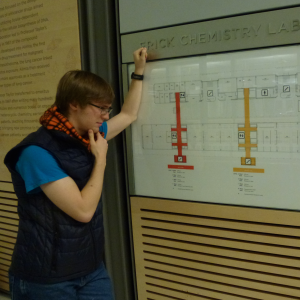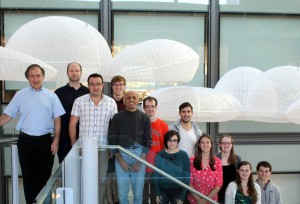It’s that time of year again – you’ve (sort of) got the hang of your classes, you have (a short) break coming up before finals, and you (kind of) feel free to think about your future in research. Your department office, OIP, PEI, and Princeton offices you’ve never heard of are sending out long lists of opportunities to do research in fantastic, far-off places – China! France! San Francisco! The E-Quad!

How do you choose? A few weeks ago, Stacey wrote an excellent post detailing a few of the clearinghouses researchers have for finding opportunities, and my fellow correspondents are working on a Resources for Researchers list of opportunities and support systems for researchers on-campus (watch this space). But with so many opportunities out there, it’s hard to be sure that you’re choosing the best one. Whether choosing a summer internship, a JP, or a thesis advisor, here are a few things you can think about as you pick what to apply to and listen to.
(Since I’m a biochemist, some of the following advice is particular to lab research, but much of it is worth considering on the search for field or archive research or (shudder) post-graduation jobs.)
Step One: Relax. There are many good opportunities out there, and no single scale to judge them on, so you will never know if you’ve chosen the “best” one. The key is that you (brilliant Princeton student that you are) will pick up skills, experience, and insight from any number of them. But if you go into it constantly questioning whether you would have gotten more from a different research project, you’re not going to be well-positioned to get as much possible out of whatever project you end up doing. My first summer of research was in yeast genomics. Am I still at all interested in a future studying yeast genomics? No. But the data analysis, record-keeping, and research skills I learned will stay with me forever.
Step Two: Think of skills you have, or that you want to build upon. Even if you’re not interested in, say, shepherding E. coli or troubleshooting NMR machines in the long run, cell culture and spectroscopy are useful skills for all manner of research – if you can find a problem you’re interested in, and you can solve it while learning new skills, do it!
Step Three: Find problems you’re excited to solve, or questions you’re excited to answer. Research can often be frustrating, and if you’re not interested in the end goal, you’re going to have a tough time staying motivated in the day-to-day. It’s a lot easier to get to work when I remind myself about how wicked cool the proteins I’m designing will be if I succeed.
Maybe you’re not sure what problems you’re interested in solving. Talking to older students about their work, attending guest lectures, and even pursuing interesting questions in class can help point you in the right direction (or one of many right directions). Somewhere, you’ll feel that tingle of excitement — this research could be onto something really freaking cool. Follow that instinct.

Step Four: Find a good lab environment. Some labs are their own universes, with sub-groups, semi-annual retreats, cliques, and inside jokes, all overseen by a PI who’s rather distant from the day-to-day. Others are miniscule: the lab I worked in freshman summer was me, my PI, and two lab techs. There are advantages to both. In small labs you’ll often have the chance to work side-by-side with your PI to directly benefit from the expertise of scientists at the pinnacle of their fields — as an added bonus, they’ll know you better for that all-important rec letter. In large labs you’ll have many more students to learn from and bounce ideas off of regarding your research and, if they’re a few years more experienced than you, regarding your life and future. I’m a fan of the mid-size lab, which I think provides a happy medium, but you should find the one which best serves your personality and needs. Whatever size you choose, make sure the grad students seem genuinely happy and sane: both your research and your well-being will benefit.
Step Four-and-a-half: This should be obvious, and it’s seldom a problem, but make sure you actually like the people in your lab. Especially as an undergrad, there’s no reason to toil under a research advisor or mentor you don’t work well with. Nobody benefits from that.
A diamond may be forever, but an undergrad research project certainly isn’t.
Step Five: Don’t be afraid to try something you wouldn’t think of trying! A diamond may be forever, but an undergrad research project certainly isn’t. Even if it’s your senior thesis, you’re not going to be locked into this niche for the rest of your career. Nothing beats hands-on experience for figuring out what research projects excite you. And if it turns out that’s not the project you want to devote your life to, that’s OK too. You’ll pick up new skills, contribute to the group, and move on: older, smarter and, perhaps, wiser.
— Bennett McIntosh, Natural Sciences Correspondent

